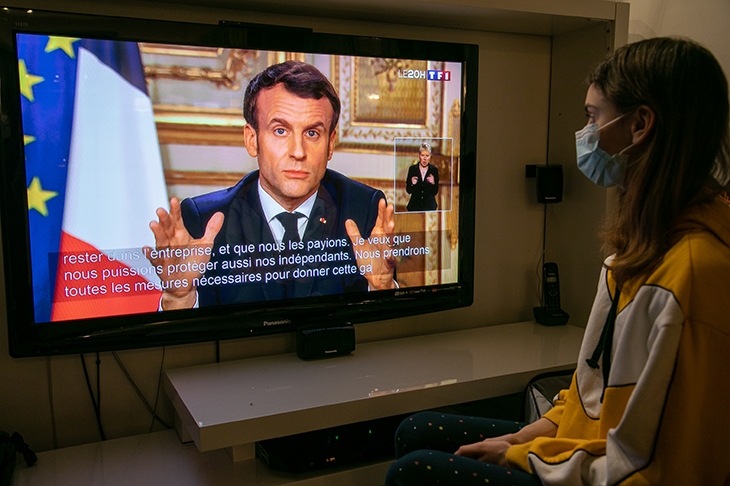Montpellier, France
Last week, the French were amused at Anglo-Saxon hoarding of toilet paper, known vulgarly here as ‘PQ’ — papier cul. Now France itself has tested positive for panic. Supermarkets across the country have been under siege, shelves stripped bare of toilet paper and much else. The government has already requisitioned all supplies of face masks and slapped price controls on hand sanitizer — with foreseeable results. Sanitizer is now scarcer than PQ and not even hospitals have enough face masks.
When President Emmanuel Macron first went on television to reassure the French, his typically prolix message served to fertilize general nervousness. He returned to the nation’s screens on Monday night to declare France to be ‘at war’ with an invisible enemy. The strategy he had announced a few days earlier was abandoned. Restaurants and bars are to close and a 15-day lockdown was imposed, with €135 ($145) fines for violations and 100,000 police to enforce the rules — plus the army too, where necessary.
‘The one way of making people hang together is to give ’em a spell of the plague,’ wrote Albert Camus in La Peste, the existential classic invoked by Macron last week. Macron has surely read Camus, but it’s not clear that the French are hanging together. As he knows, this is an unruly country: imposing order is tough at the best of times.
French self-confidence is shaken to the bone. Macron’s early boasts that French virologists are the best in the world looks doubtful as the government struggles to contain the outbreak, or even supply the hospitals. The president’s appeals for European solidarity reflect wishful thinking. There’s a French idiom, ‘sauve qui peut’, which translates as ‘every man for himself’. This seems to have been the motto of every EU nation state: national interests are trumping everything. The Germans and Spanish demonstrated their solidarity by introducing frontier controls on the French border; Germany at one stage refused to export face masks even to Austria.
Macron’s speech on Monday night might have been more convincing had he not proclaimed exactly the opposite less than a week earlier. His decision that last weekend’s municipal elections would go ahead despite the call for ‘distanciation sociale’ looks extraordinary and unnecessary given his demi-tour within 24 hours, postponing the second round of voting until June. The results of those elections exposed his general predicament. Amid record abstention, his candidate for mayor of Paris (ironically, his former health minister) was crushed into third place, behind the socialist mayor and the conservatives. His prime minister, Édouard Philippe, who wants to double as mayor of Le Havre, has been forced into a run-off with a communist. The nativist Rassemblement National of Marine Le Pen swept the south.
The rules of the French lockdown look severe but they are not necessarily practical. Guidance on the Interior Ministry website is vague. The scene is one of obvious confusion. Airports are to remain open, but it seems forbidden to drive to one. Everyone in France is to be confined to their homes for 15 days, save for ‘essential’ displacements. Essential is largely undefined. I am doubtful that the isolation will prove either effective or durable, especially if it’s extended.
Even dinner parties are banned. It is now illegal to visit relatives or friends. Gendarmes are to issue on the spot fines. Other details remain obscure. The population remains uncalmed. The police are already outside supermarkets and lines are forming at gas stations.
This would have tested the most efficient and popular government. But Macron’s popularity was pretty low before this started: his administration, which had looked arrogant, now looks clumsy and even a little pitiful. Only weeks ago, its spokeswoman was dismissing the pandemic as exaggerated. It then gingerly stepped up its precautions, although always inconsistently. Macron took his wife Brigitte to the theater, in an effort to demonstrate that everything was normal. Days later, the government closed theaters, bars, restaurants, cinemas and all shops other than those selling food, pharmaceuticals, tobacco and lottery tickets. As the gilets jaunes mounted desultory demonstrations last weekend, police unions were complaining that officers were not equipped with face masks or hand sanitizer. Paris cab drivers, oddly, seem well supplied with both.
A friend who goes to a local hospital every week for chemotherapy told me on Friday that neither patients nor staff were provided with masks or any other protection. Hospitals in Alsace, a hotspot in the crisis, are running out of supplies. The army is being mobilized to set up field hospitals.
The obvious risk now is one of social disorder, especially in the sensitive districts of the cities, where the government’s grip is tenuous at best. In small, semi-rural communes such as my own, there seems little danger of this. But there has been a dramatic change in social behavior. Handshaking and kissing, a quintessential element of French life, have stopped. The village bar, previously the center for gossip, has pulled down its shutters. The social cohesion that has made French village life so agreeable, in which people say bonjour and genuinely mean it, is being eroded. I wonder if it will ever recover.
As I write, reported cases of coronavirus are soaring across France, with more than 5,000 known infections and more than 100 deaths. In truth, the number of infections is certain to be vastly greater, but Macron’s world-leading virologists have no more idea than anyone else. There were reports at one point that three people an hour were dying. French public health services, long complacently regarded as world-class, seem woefully unprepared for this. Medical staff are demoralized. A friend who is a nurse says she and her colleagues are being forced to work without proper protective equipment, and even when they are themselves sick. Faced with an invisible enemy, people are scared. The news that one stricken resident of our village is in hospital in Béziers, in an induced coma, has shaken many here.
Perhaps Macron can relaunch his presidency as a warrior against disease: voters can be forgiving in such circumstances and he’s likely to get some kind of bounce in the polls. But the fundamentals are not encouraging. The economy is visibly crashing — here, as elsewhere. Unemployment will likely soar. Renault and PSA Citroën have closed their factories. Airbus is menaced, Air France on its knees. There is now no prospect of the economic revival on which Macron based his presidency.
In many places, the government is already stretched to breaking point. Last weekend at Montpellier airport there were no arrival health controls at all. By contrast, my American brother-in-law told me that every passenger at Taipei airport that day was put through a health check, including a temperature and fingertip scan. The French have managed only to put up posters.
Only a fool would predict how this disease is going to play out, if the government strategy is sound or even if it has the ability to execute the strategy it’s got. Macron’s promise that ‘no business whatever its size will face risk of bankruptcy’ will be hard to honor: the French economy is palpably in freefall. Like everyone else, Macron is guessing — and doing whatever he can think of to prevent ending up with Italian-style horror scenes in French hospitals. And like everyone else, all he can do is hope.
Jonathan Miller is the author of
France a Nation on the Verge of a Nervous Breakdown (Gibson Square). This article was originally published in The Spectator’s UK magazine. Subscribe to the US edition here.


















